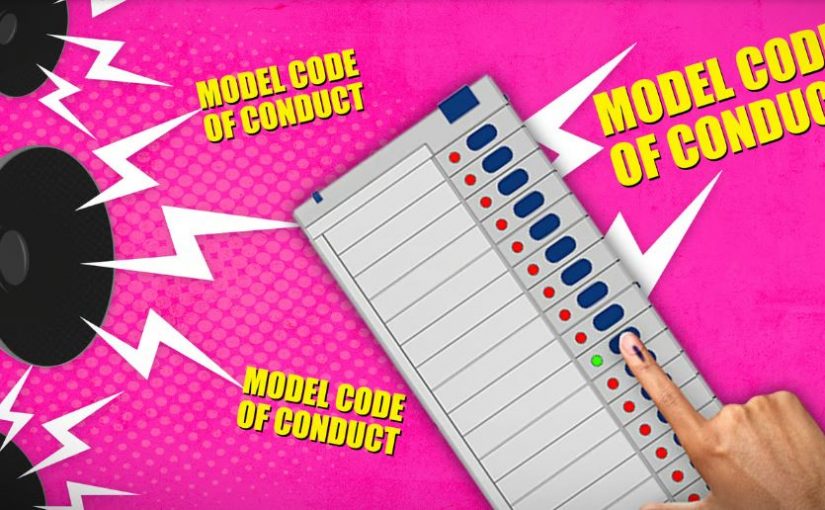By:Anand Vardhan
Several legal constraints come in the way of strict enforcement of the MCC. But is there any recourse?
The recently announced seven-phase Lok Sabha polls have once again put the spotlight on the Model Code of Conduct. The poll code came into force immediately after the Election Commission of India notified the general elections on March 16 and will remain so till the results are declared on June 4.
Over the past few days, the ECI has already issued notices to parties, state governments, the central government, and individual candidates for violation of the code, despite giving specific directions for its implementation.
But these are the early days. Going ahead, the ECI is likely to be flooded with instances of non-observance of the code in different parts of the country. That would follow an old question that the poll body has been grappling with for decades: To what extent can the ECI go to punish the erring candidates, campaigners, and parties?
Besides issuing notices and time-bound suspensions of individual campaigners, does the MCC come with the legal teeth to ensure strict compliance and, more significantly, to punish non-compliance? So, the talk about the legal constraints that ECI faces in taking punitive measures against the MCC violators is likely to resurface in the public realm.
Interestingly, in the past, the ECI has had opportunities to seek powers for legal enforceability. But the poll body wasn’t keen on having the legal backing to impose harsher punishment over MCC violations.
One such chance was in 2013, when the standing committee on personnel, public grievances, law, and justice recommended making the MCC legally binding and making it a part of the Representation of People Act, 1951.
Far from exulting in what the committee recommended, the poll body has been reluctant to see value in it. On the contrary, the ECI has foreseen some practical perils in introducing legal obligations to the MCC.
One of the concerns that the ECI had in mind is quite apparent. If every matter related to the violation of the MCC, and the ECI’s response, gets legally contested in court, the prolonged legal proceedings will derail the election calendar.
The elections have to be completed within a time frame, and incorporating legal provisions into the MCC entails a scenario where the parties and candidates in question will seek legal redressal against the ECI’s action. The protracted process of such legal challenges will defeat the purpose of timely elections and swift discretionary decision-making by the ECI.
There is another scenario that the poll body can foresee as inimical to electoral choices. This is when a strict measure – say, deregistering a party or banning a candidate for violations – disrupts the political process, as one of the key stakeholders is ousted from the fray.
But it isn’t that the nature of the MCC as “guidelines” leaves the ECI with no other options for legal measures against the erring political parties and candidates. One recourse, for instance, is paragraph 16A of the Election Symbols Reservation and Allotment Order, 1968. The provisions therein can be cited to suspend or withdraw recognition of a political party in case of serious violation of the model code.
In the midst of the poll process, however, such action would again lead to long legal proceedings and run into the same practical challenge of conducting the polls within a time frame. So, the limitation remains: the non-enforceable legal status of the code makes any punitive action citing it legally doubtful and vulnerable in court proceedings.
So, even if Article 324 of the Indian Constitution empowers the ECI with wide-ranging powers for the conduct, superintendence, and direction of polls, the poll body has been aware of the legal constraints as well as practical realities of poll administration that come in the way of strict enforcement of the MCC. Perhaps it’s this acknowledgement of a mix of realities that restrains the ECI from functioning like a “super government”, as PDT Achary, former secretary general of the Lok Sabha, observed while reflecting on the extent of the poll body’s powers.
Given these constraints, the other options for the ECI for ensuring serious consequences for those flouting the MCC have generally been to invoke the relevant sections of the Indian Penal Code, 1860, the Code of Criminal Procedure, 1873, and the Representation of People Act, 1951.
The poll body has already been relying on these statutes for violations, including the latest cases of MCC violations like the one that was reported from Karnataka earlier this week.
At the same time, there is also a section of opinion that favours the 2013 parliamentary committee’s suggestion of making MCC legally enforceable and including it as a part of the RPI Act, 1951.
Even if there have been a lot of inputs, ranging from legal, as in the 2015 Law Commission’s report on campaigns, to technological suggestions about the use of AI for monitoring MCC compliance and violations, the extent of punitive action against offenders remains a delicate subject.
The ECI is generally sought to be attentive to the practical realities of the electoral contest, its time frame, and the legal process while adhering to the MCC regime without invoking legal consequences.
In the coming few weeks, the balance of this approach will face the tumult of an expectedly raucous poll season. Will the EC then be tempted to seek more punitive powers by dusting off the 2013 parliamentary committee report for a rethink?
Courtesy: Newslaundry
